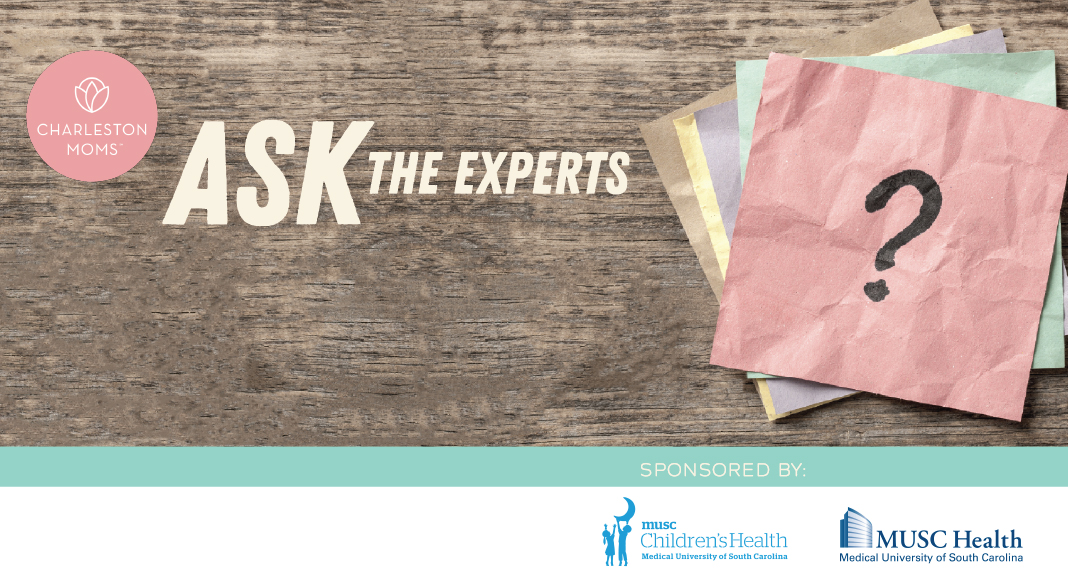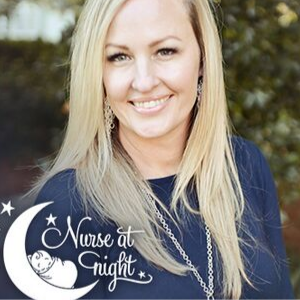One thing we all have in common as parents are questions. Lots of questions. Whether it’s concerning how to save for your child’s college fund, best practices for dental care, or how to talk to your child about a death in the family, it can feel overwhelming at times. While Google is handy, it can also be confusing and most importantly, unreliable.
We are so excited to introduce a new feature on Charleston Moms called Ask the Experts where a team of local experts will answer your burning parenting questions in a monthly blog post. Our hope is that you get answers to some common questions that many parents have and connect with these amazing resources right here in our community!
Want to learn more about our team of local experts? Have a question? Ask it here and it will be answered in next month’s post!
*This is a sponsored post, presented by our valued local partners. While we love sharing these resources with our readers, we have not personally vetted each individual business represented here and encourage our readers to do their own research to find the best fit for their family.

Children's Health
Q: Do local parents need to be concerned about their young children and Coronavirus at this time?
A: The COVID-19 pandemic is here…panic or chill? Experts say be smart. Here are a few key tips:
• Wash your hands with soap and water for at least 20 seconds. If soap/water is not available, use an alcohol-based sanitizer (60% alcohol or higher) instead.
• Stay away from others who are sick and stay home if you or your kids are sick.
• Avoid touching your face and teach your children to do the same.
• Avoid travel to highly infected areas.
• Don’t shake hands; use alternate greetings such as “jazz hands” or “peace sign”
• Be kind. Look out for your neighbor and those less fortunate
• Practice social distancing. It’s a good time for a walk in an uncrowded park, reading, arts & crafts. Avoid large gatherings. Even people infected with this virus (or other viruses) but without symptoms are infectious for days before developing symptoms. Even though people look well, they may be infectious.
• Keep older friends and family at home and away from crowds; they are at high risk.
• Get information from responsible sources such as AAP, CDC, WHO, or your pediatrician.
• Don’t go to the pediatrician, urgent care, or emergency department with mild illness at this time. Instead, call your primary care provider or use virtual visits such as MUSC’s virtual visit platform, which is currently free to anyone in SC.
Note there have been many coronavirus strains circulating around the country in children and adults for years, but this is a novel coronavirus. Keep informed, stay safe, and look out for one another!
Expert(s):
Elizabeth Mack, MD, MS
Division chief of pediatric critical care
MUSC Children’s Health

Women's Health
Q: What do pregnant women need to know about the Coronavirus?
A: We are all very aware of the ongoing pandemic associated with a new coronavirus referred to as COVID-19. This virus is a novel strain first identified in 2019. Although this is a new coronavirus, this is not the first time that healthcare providers have encountered coronavirus. Other coronaviruses include SARS (severe acute respiratory syndrome) and MERS (middle east respiratory syndrome). Information about the impact of COVID-19 in pregnancy is very limited and recommendations may change over time.
Social distancing is currently recommended to avoid the spread of COVID-19. If working remotely is possible with your job, this should be explored with your employer. If you are a healthcare worker, first responder or have a chance of caring for someone with COVID-19, please contact your supervisor to discuss appropriate measures to limit the risk of transmission.
At this time, coronaviruses of any kind are not thought to be vertically transmitted. In other words, if you get the virus, we do not think your fetus is at risk for getting sick in utero.
We do not feel pregnant women are more likely to become infected with COVID-19 than non-pregnant women. Most cases of COVID-19 cause mild to moderate symptoms such as cough and fever. However, a small number of young healthy people (<45 years old) can get severe symptoms and require hospitalization and potential respiratory support. The rate of severe disease in young people reported from China is up to 8%.
We do know some viral illness such as Influenza A and B can be more severe in pregnant women than in non-pregnant women. At this point, 2 case reports of 22 women 19 of whom delivered their babies suggests this is not the case for COVID-19. However, we feel that the number of cases in this report is too low to be assured that the disease is not modified by pregnancy. There may be an increased risk of preterm delivery associated with COVID-19.
Pregnant women who are severely ill with any viral illness, such as the flu, can have complications during pregnancy. We do not yet know if this happens with COVID-19. If you have symptoms worrisome for coronavirus including but not limited to fever, cough, shortness of breath, please go to the MUSC Health website and have a virtual visit (https://muscvirtualcare.
Expert(s):
Barbara Head, MD
OB-GYN Maternal Fetal Medicine
MUSC

Mental Health
Q: What are some ways to recognize depression in teens?
A: Being a teenager can be tough. Being a parent of a teenager can also be tough. Changes are taking place in their bodies and brains that can impact how they think, learn, and behave. It is normal for them to have emotional up and downs and it is going to be difficult for them to face the tough and stressful situations.
Ultimately you know your teen. Yes, they may have periods of time where you are not sure who is living in your house, but trust yourself. If you have noticed an extreme change in behavior/mood that lasts more than a few weeks/months, if they are experiencing problems concentrating, or not wanting to participate in things they used to enjoy, then it may be time to have them speak with a mental health professional. Other warning signs may be: self-harm, eating disorders, talk of suicide and substance abuse.
Expert(s):
Amy Jackson
Licensed Professional Counselor
Sweetgrass Counseling

Oral Health
Q: My son is getting braces put on and is sad about all the things he can’t eat while he has them, so, what are some food ideas that we can stock up on and get him excited about his new smile?
A: Oh! I get this question quite a lot… typically from my boys! The unique thing about braces is that you want them to stay on while we are working on your smiles, but we, OF COURSE, want them to come off at the end. So if you eat things that are super hard or sticky, the braces can unexpectedly come off. It’s certainly not an emergency if things break during treatment, but you would like to minimize this as much possible.
The first week with braces is the biggest adjustment period. Almost like getting used to a new pair of dress shoes, your mouth will need to get used to your new tooth “accessory.” The best foods for this time are soft foods. We highly recommend a post-braces smoothie at our office. Mashed potatoes, mac-n-cheese, soup, and of course ice cream are great too! Things to put away for after braces would be all the icky-sticky, ooie- chewy, super crunchy things such as sugary bubble gum, hard nuts, etc.
I hate to give hard no’s to certain foods because kids can do just fine eating things like popcorn and chips with braces. They just need to be careful about eating these things. Eating one kernel of popcorn at a time vs one giant fistful after another can make a big difference in keeping your braces intact.
Check out our Instagram and Facebook page @summervillesmiles to score some braces-friendly recipes.
Quick List of Dr. Katie’s favorites:
*Pirates Booty (great popcorn alternative)
*Icecream
*Mac-n-Cheese
*Smoothies
*PBJs
*Soup
*Yogurt
*Chocolate:)
*Fruit such as bananas, blueberries, strawberries, oranges. Cut up apples
*Applesauce
*Cheese
*Pasta
*Soft cooked veggies like green beans or broccoli
Expert(s):
Dr. Katie Bullwinkel
Board Certified Orthodontist
Bullwinkle Orthodontics

Financial
Q: What kind of life insurance is best for the average family?
A: There are two main types of life insurance. The first is term. It is temporary and meant to provide a large amount of coverage for a specific amount of time. It’s like renting, you make monthly payments and once the 10 year or 20 year period is over, it’s gone. This type of insurance tends to be cheaper and is going to be there for the “what if.”
The other type is what we call whole life which is permanent. As long as you continue to make your payments, it will never go away. Similar to owning a home, you own this type of insurance in the sense that you build equity. New York Life is a mutual company. This means that instead of paying dividends to stockholders, we pay them to our policyholders. Our policyholders can have the dividends go into their policy to increase their equity which we call “cash value” and increase the face amount over time. This type of insurance tends to be more expensive but is going to be there when you need it.
The best option for every family and situation is going to vary. Most young families we work with start out with a large face amount term policy. This covers the house, school, daycare, and all the expenses that come with having children. While your kids are growing up there is a need for a large amount of coverage so your children and spouse will be able to live comfortably should something happen to you. These policies tend to more affordable for a young family just starting out. Over time, our clients can convert these polices to permanent whole life. Whole life can be used as a savings tool for many families. While they have the death benefit, they also have the cash value account. If set up properly individuals can borrow money tax-free in the event of an emergency, to pay for house renovations, to pay for college or even draw from in retirement.
Most clients typically do a blend of both. If you would like to discuss which type of life insurance might be best for you click the link below.
Expert(s):
Caroline Mahoney, Financial Services Professional
Steven Fazio, Financial Services Professional
Riley Knudsen, Financial Services Professional
New York Life, Charleston

Education
Q: What are some tips for keeping busy parents involved in their kid’s education?
A. Note: several of these tips assume that we are living in “normal” times, but most of these have virtual counterparts. Also, please read through to the end for some tips for being at home with school-aged children.
There are so many things even the busiest parent can do to stay involved in their child’s education. It is important to note that “involved” does not mean helping with each assignment or project. Being involved means that you are a resource for your child. Your job is to provide the tools he or she needs to succeed.
• Set aside 5-10 minutes each day to talk about school. Go beyond asking, “How was your day?” Most likely, you will not get the answers you are looking for with this question. Ask more specific questions like, “You said you were reading Charlotte’s Web. Who is your favorite character?” or “I know that history project is coming up. Do you have all the supplies you need?” These questions don’t have to be about academics. Try to ask open-ended questions about assemblies, speakers that came to school, etc. Also – think about the timing of these questions. Right when your child gets in the car at pickup may not be the best time. They may be more forthcoming over a snack or at dinner time.
• Provide the help your student needs to be their best at school. Get them involved in a conversation about this. Do they need specific supplies? Do they need a better space for studying?
• Read all school and teacher communications thoroughly. Schools provide a lot of information, but it is very important that you take a few minutes and read it.
• Attend and/or request teacher conferences and go to them with a positive attitude. Remember that the purpose of these meetings is to help teachers and parents get on and stay on the same page to support the student.
• Attend school events and volunteer when your schedule allows. It’s OK that you can’t come to every class event. At the beginning of the year, review the volunteer opportunities and class trips and go ahead and commit to a couple. That way, you can plan ahead to make room for those in your schedule.
Now that we are in these challenging times, education looks very different. There are several things you can do now to help your student transition to online learning.
• Establish a daily schedule. Write out a schedule for each day and post it somewhere very visible. Get your children involved in making the schedule.
• Eat healthy and exercise. Get outside!
• Provide ways for your child to communicate with their friends – FaceTime, phone, writing notes.
• Get siblings to help each other with schoolwork.
• Consistency is key. Get up and go to bed at the same time as usual. Have your children get dressed and make their beds to start the day on a productive note. Stay as close to your normal weekday routine as possible.
Expert(s):
Joanne Stemple
Director of Communications
Mason Prep School

Newborn Care & Postpartum Support
Q: What can I do to help my baby, who has reflux, more comfortable at night? I’ve heard that elevating the crib mattress can help, but that makes me nervous…
A: REFLUX!!! Reflux is such a common concern with parents and most of the families I consult with share their worries about the likelihood that their baby has reflux.
At the bottom of the esophagus is a sphincter that opens and closes as food/liquid moves down. For the first few months of life the baby’s esophageal sphincter is still developing. You may find that because of this your baby will spit up more often. This is a normal part of growing and developing. Spit up does not mean that your baby has reflux. If you are concerned about the amount of spit up that your baby has, please contact your pediatrician.
It is also important to know common reflux symptoms:
– vomiting (crying with spit-ups usually 30/45 mins after feeding)
– refusal to eat
– irritability with feedings
– failure to gain weight
– arching of the back
What can you as a parent do to help:
– follow up with the pediatrician to see if medications are recommended
– hold your infant upright for 10-15 minutes after the feeding
– frequent burping (every 1-2 oz)
– place a wedge under the crib mattress (make sure sleep space is set up for safe sleep)
– If you use formula and your doctor thinks that your baby may be sensitive to milk protein, your doctor may suggest switching to a different type of formula.
Commonly parents will confuse reflux symptoms with over tiredness. Babies that are overstimulated and aren’t sleeping well will show similar symptoms. Once your baby is two weeks old and back to their birth weight you can begin to implement a more structured routine. I have found that a structured feeding schedule dramatically decreases reflux symptoms. Reflux symptoms typically start to appear around 4 weeks of age and begin to decline around 8 weeks of age, peaking around week 6. This too shall pass. Use the above recommendations and contact me if you would like further support and guidance.
Experts(s):
Liz Price
RN
Nurse at Night











